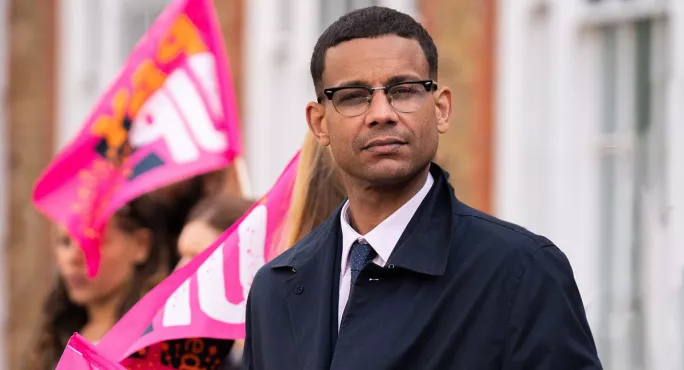NEU: Teachers could strike in September

Teacher strikes in England could take place as early as September if the largest education union moves to a formal ballot for strike action over pay and funding, a union leader has warned.
The revelation comes after it emerged last week that teacher-members of the NEU had voted overwhelmingly in favour of strike action in an indicative ballot over teacher pay and school funding.
Speaking to members of the press at the union’s annual conference in Bournemouth today, NEU general secretary Daniel Kebede said: “My view is if there is a decision to go for a formal ballot, we should conduct that over a fairly significant period of time looking to take action in September.”
Mr Kebede was responding to questions about when teachers could walk out if the decision to move to a formal ballot was made - a move he confirmed was still on the table.
However, Mr Kebede said the timing of any strike action would ultimately be a question for the union’s executive.
‘Anti-democratic strike thresholds’
The results of the union’s indicative ballot over strike action showed 90.3 per cent of the NEU teaching union’s members who voted in the preliminary ballot said yes to strike action, with a turnout of 50.3 per cent.
In a formal ballot, the NEU would have to reach a 50 per cent turnout to achieve a legal mandate for action.
Asked by Tes if there were concerns that a formal ballot - which would be carried out by post - would reach that threshold, Mr Kebede admitted that the union would “absolutely consider the amount of work it would take to get through this government’s anti-democratic strike thresholds”.
- Background: Nine in 10 teachers back strikes in NEU indicative ballot
- Conference: Education system has had ‘failure baked in’ since Gove
- Exclusive: DfE aims to keep three in four pupils in school during strikes
However, Mr Kebede added that he doesn’t think the mood is abating and, “if anything”, there is “more and more frustration developing among the profession” as they see the government “burning down the house”.
Tes revealed earlier this year that the NEU had said teacher “engagement and anger” would need to be “ramped up” for its campaign on teacher pay and school funding to succeed.
The union’s members are due to debate an emergency motion over next steps at its conference.
While the motion’s wording does not currently include an instruction to the executive to move to a formal ballot, an amendment to this effect could still be introduced before tomorrow’s vote.
However, even if the move was not debated at the conference, the union’s executive could later decide to move to a formal ballot due to the indicative ballot result.
Keegan must listen to avoid ‘collision course’
Mr Kebede was also pushed over joint action after members of the NASUWT teaching union last month voted against holding a formal ballot for industrial action over pay and working conditions.
Asked if any decisions over balloting could be influenced by NASUWT, Mr Kebede said that the sister union had not taken any national strike action in England and Wales “for a significant period of time”.
He added: “They weren’t out with us last year. So while I’m sure the conference is aware of NASUWT’s decision, I can’t imagine it having a huge amount of influence.”
The leader of the NEU also stressed that any decision to take strike action “will not be a decision taken lightly” and would not be “gesture politics”.
“Education is in a poly crisis at the moment...should our members wish to take action on the issue of pay and funding in the context of the general election year, that certainly wouldn’t be gesture politics at all or token,” he said.
Mr Kebede also said that education secretary Gillian Keegan “should really be listening deeply to the media rounds to what is coming out of this conference”.
“I’m ready to open up some serious talks and discussions so we don’t end up on a collision course,” he said.
‘National contract for education’
Meanwhile, NEU members today voted to begin planning for an industrial action strategy to win a “national contract for education”, which would apply to all employers amid concerns over workload.
This “national contract” would bring binding pay and conditions across the profession and would apply across both the academies and maintained school sector, the union said.
Members also instructed the union’s executive to prepare a timetable for action, “aimed at winning a new national contract for education by September 2025”, in a vote supporting a motion at the NEU annual conference this afternoon.
Responding to the vote, Mr Kebede said the union would “continue putting pressure on the government to live up to its commitments to reduce workload and working hours - and...will intensify our campaign to achieve the reductions needed”.
A Department for Education spokesperson said: “The independent STRB is currently considering evidence for this year’s pay award, unions should engage with this process instead of striking before they even know what the pay recommendations are.
“Further strike action would cause more disruption to pupils who have already lost over 25 million school days due to last year’s industrial action.”
For the latest education news and analysis delivered directly to your inbox every weekday morning, sign up to the Tes Daily newsletter
You need a Tes subscription to read this article
Subscribe now to read this article and get other subscriber-only content:
- Unlimited access to all Tes magazine content
- Exclusive subscriber-only stories
- Award-winning email newsletters
Already a subscriber? Log in
You need a subscription to read this article
Subscribe now to read this article and get other subscriber-only content, including:
- Unlimited access to all Tes magazine content
- Exclusive subscriber-only stories
- Award-winning email newsletters
topics in this article



